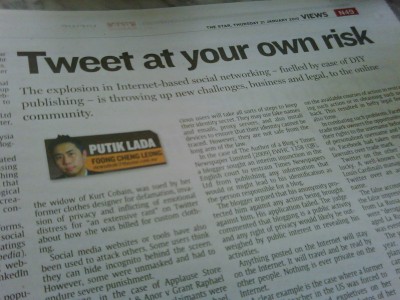I wrote the article below for the Putik Lada column in The Star. It was published on 12 May 2011. Chekkit!
Social media can be a powerful tool to promote your goods or services, but the online world is unpredictable and no matter how good a brand is, there will be someone hating it.
IT is now the norm for brand owners having social media network accounts such as Facebook, Twitter, Wikipedia, forums and blogs to connect with their customers.
With such social media tools, brand owners can communicate with their customers directly on queries, promotions or even in friendly banter.
In the social media world, everything is fast and any delay is a missed opportunity. One does not wait for the board of director’s approval to post a reply to a message.
But with such pace, the risk of misstatement is imminent.
Such accounts could be managed in-house or outsourced to third parties which could be digital agencies, public relations firms or freelance social media managers.
It is important to find parties which have experience in dealing with Internet users.
The recent Energizer Night Race 2011 incident is a wake-up call for all brand owners. In this case, a Facebook page was created to promote the Energizer Night Race.
Unfortunately, some glitches marred the event. Immediately after, hundreds of unhappy comments started flooding the Facebook page. Some users alleged that their comments were deleted and this resulted in more unhappy comments being posted.
Soon, bloggers started covering this incident and even Energizer hate pages were created. Individuals involved in this event were also attacked and insulted.
Energizer was merely a co-sponsor, with the event actually organised by a third party.
It took Energizer and the organiser a few days to issue an apology. Unfortunately, by then, the damage had been done. Never underestimate the wrath of angry Netizens.
Brand owners or service providers are advised to deal with complaints promptly. Complaints should not be ignored or deleted. They should be treated like any other complaint. Sometimes a short statement like, “We’ll get back to you shortly” or a simple apology is sufficient for grieving consumers.
Social media is a powerful tool to promote your brand but can also be the cause of one’s downfall. Social media disaster comes in various forms – through website malfunctions, inaccessibility, becoming uncontrollable or a misstatement by the brand owner.
The legal side also has to be taken care of. Users of social media sites should abide by and agree to the terms of use and also privacy policies.
A contract should always be in place between the brand owner and the social media service provider. A social media service contract is not far different from any normal service level agreement. However, attention must be given to certain clauses.
Brand owners should dictate the format of the content posted by the service provider. Format would include the length of postings, topics to be posted and frequency of updates. Having an inactive social media page defeats the purpose of having one.
The parties must agree to have a guideline for unacceptable postings and comments. Defamatory, spam and sexually explicit contents are some examples of unacceptable postings. Topics relating to politics, religion, race, gender, nationality or sexuality should be avoided.
If there is a need to remove offending content, it should be done immediately. However, there should be some room for minor vulgarity as it is common online.
The parties must decide what postings require an immediate response and who will flag it.
As shown by the Energizer Night Race case, there must be a contingency plan to deal with social media disasters.
There must be an obligation on the service provider to report any incident threatening the integrity of a brand. A prompt response to any complaint or threat would help avoid a massive disaster.
There is also a recent trend called “Tweetjacking”, a minor prank where a friend uses your account to post embarrassing messages. However, such a prank can be damaging if posted using a company account.
This happened in the Singapore Straits Times (@stcom) case where the Twitter handle was used to post vulgarities to its 46,000 followers. Soon, other media started reporting this incident.
The lesson learned: limit access to social media applications.
Personal data is processed during the use of social media sites. Such processes may fall within the ambit of the Personal Data Protection Act 2010 (not in force at the time of writing) and thus the obligations under the PDPA must be fulfilled.
Brand owners should consider doing a privacy impact assessment. As for how personal data is stored (Notice Principle), brand owners may add a Privacy Policy on their Facebook page (e.g. as a Tab) or blog.
Facebook Apps also collects personal data of users, which is sometimes disseminated to other users. In the United States, a company was sued for breaching privacy laws by posting online purchases of their customers on its Facebook page.
In the event of termination of a social media services agreement, the service provider should be compelled to give immediate access to the sites and deliver up all logins and passwords. This will avoid situations where a brand owner’s website becomes inaccessible.
Lastly, brand owners and service providers should discuss whether the latter should indemnify the former in the event that the former suffers damages due to the website. Ideally, the latter should indemnify the former due to the acts of the latter.
This is important especially when, for example, an employee of the social media company posts a defamatory message about another party, which results in that party suing the brand owner.
The steps are non-exhaustive and are merely to reduce the damages and risks. The online world is unpredictable and no matter how good a brand is, strangely, there will be someone hating it.
Being a case study for a social media disaster is a disaster.



